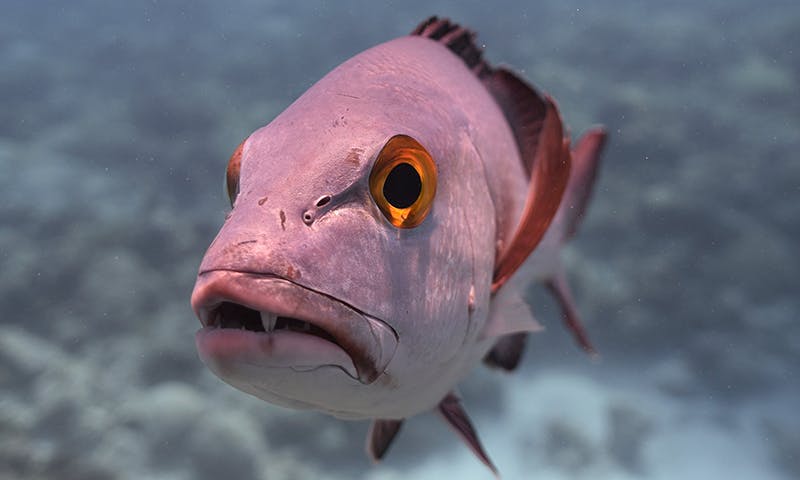This snapper could be 80 years old

 Explore
Explore
On July 31, my mother turned 88. Based on recent findings, it's entirely possible, if not likely, that a fish somewhere turned 88 on the same day.
It could have been a snapper. In a study of 476 snappers of three species caught along the west coast of Australia and the Chagos Archipelago in the Indian Ocean, 11 specimens were over 60 years old. A two-spotted red snapper was 79 and a midnight snapper was 81.
These are the oldest tropical reef-dwelling fish known to science, and are unlikely to be rare examples of longevity in these species. The 81-year-old midnight snapper was found in a sample of just 11 fish, making it unlikely researchers have stumbled upon an exception. All were apparently in good health when captured. "Some of these fish are probably almost 100 years old," says Brett Taylor, a marine ecologist at the University of Guam and leader of the study, published in the journal Coral Reefs. 1
I'm sure I'm not the only one who feels deep respect for a being who can live so long.
As venerable as these snappers are, they are far from the reigning sea Methuselahs. Two male orange roughy - a deep seamount dweller - caught off Tasmania were 230 and 245 years old. Greenland sharks may live even longer, with a female examined by researchers tipping the scales of time at 400 years, plus or minus a century. There could be Greenland sharks slowly navigating under the Arctic ice today that began life before Christopher Columbus set foot on American shores.
It is not known for sure how and why some fish live so long, but older individuals tend to be larger, which slows metabolism, much like living in deeper, colder waters. These slow metabolisms are helpful in food-scarce environments, and genomic studies of long-lived fish have found genes associated with repairing damaged DNA and reducing inflammation, which may reduce the risk of cancer and improve the functioning of the immune system.2
Regardless of how they achieve this, I'm sure I'm not the only one who feels a deep, reflective respect for a being who can live so long. It is an extension of the respect that human cultures have for our elderly citizens. The oldest among us have gone through the vicissitudes of life and accumulated a rich experience; as Andy Rooney said, "The best classroom in the world is at the feet of an old person." When Queen Elizabeth II passed away, the ensuing outpouring of adoration and reverence was fueled in large part by her advancing age and the record length of her royal tenure.
Could we extend these feelings to older animals as well? At present, our treatment of old fish runs counter to the values we hold about old age.


 Explore
Explore
On July 31, my mother turned 88. Based on recent findings, it's entirely possible, if not likely, that a fish somewhere turned 88 on the same day.
It could have been a snapper. In a study of 476 snappers of three species caught along the west coast of Australia and the Chagos Archipelago in the Indian Ocean, 11 specimens were over 60 years old. A two-spotted red snapper was 79 and a midnight snapper was 81.
These are the oldest tropical reef-dwelling fish known to science, and are unlikely to be rare examples of longevity in these species. The 81-year-old midnight snapper was found in a sample of just 11 fish, making it unlikely researchers have stumbled upon an exception. All were apparently in good health when captured. "Some of these fish are probably almost 100 years old," says Brett Taylor, a marine ecologist at the University of Guam and leader of the study, published in the journal Coral Reefs. 1
I'm sure I'm not the only one who feels deep respect for a being who can live so long.
As venerable as these snappers are, they are far from the reigning sea Methuselahs. Two male orange roughy - a deep seamount dweller - caught off Tasmania were 230 and 245 years old. Greenland sharks may live even longer, with a female examined by researchers tipping the scales of time at 400 years, plus or minus a century. There could be Greenland sharks slowly navigating under the Arctic ice today that began life before Christopher Columbus set foot on American shores.
It is not known for sure how and why some fish live so long, but older individuals tend to be larger, which slows metabolism, much like living in deeper, colder waters. These slow metabolisms are helpful in food-scarce environments, and genomic studies of long-lived fish have found genes associated with repairing damaged DNA and reducing inflammation, which may reduce the risk of cancer and improve the functioning of the immune system.2
Regardless of how they achieve this, I'm sure I'm not the only one who feels a deep, reflective respect for a being who can live so long. It is an extension of the respect that human cultures have for our elderly citizens. The oldest among us have gone through the vicissitudes of life and accumulated a rich experience; as Andy Rooney said, "The best classroom in the world is at the feet of an old person." When Queen Elizabeth II passed away, the ensuing outpouring of adoration and reverence was fueled in large part by her advancing age and the record length of her royal tenure.
Could we extend these feelings to older animals as well? At present, our treatment of old fish runs counter to the values we hold about old age.
What's Your Reaction?















![Three of ID's top PR executives quit ad firm Powerhouse [EXCLUSIVE]](https://variety.com/wp-content/uploads/2023/02/ID-PR-Logo.jpg?#)







